- The Oral B 3000 vs 5000: Which Electric Toothbrush Is Better? - February 27, 2022
- Kid Tested and Dentist Approved: The Five Best Natural Toothpaste for Kids - February 17, 2022
- Need Orthodontic Treatment, But Not a Fan of Braces? The Five Best Braces Alternatives Available - February 7, 2022
Brushing your teeth is the most important thing for oral health hands down. It can prevent cavities and gingivitis, and help with your body’s overall health as well.
But did you know that the type of toothpaste you use can affect how well your teeth are taken care of? Especially when it comes to bad breath, the type of toothpaste you use can make a big difference. With so many choices out there, it can be daunting to know which one may be best for you.
In this article, we’ll narrow it down to the best choices for different circumstances and help you make a decision as to which toothpaste may help you best combat any issues with bad breath that you may have.
Of course, consulting your dentist may also give you good information on how to take better care of your oral health, or help you discover an underlying problem.
What is bad breath?
You may be fully aware of the problem of bad breath, or it may be of some surprise to you that this issue can affect anyone, and it even has a medical name. Bad breath is known as halitosis in the medical community – and it can have multiple different causes that aren’t just poor dental hygiene.
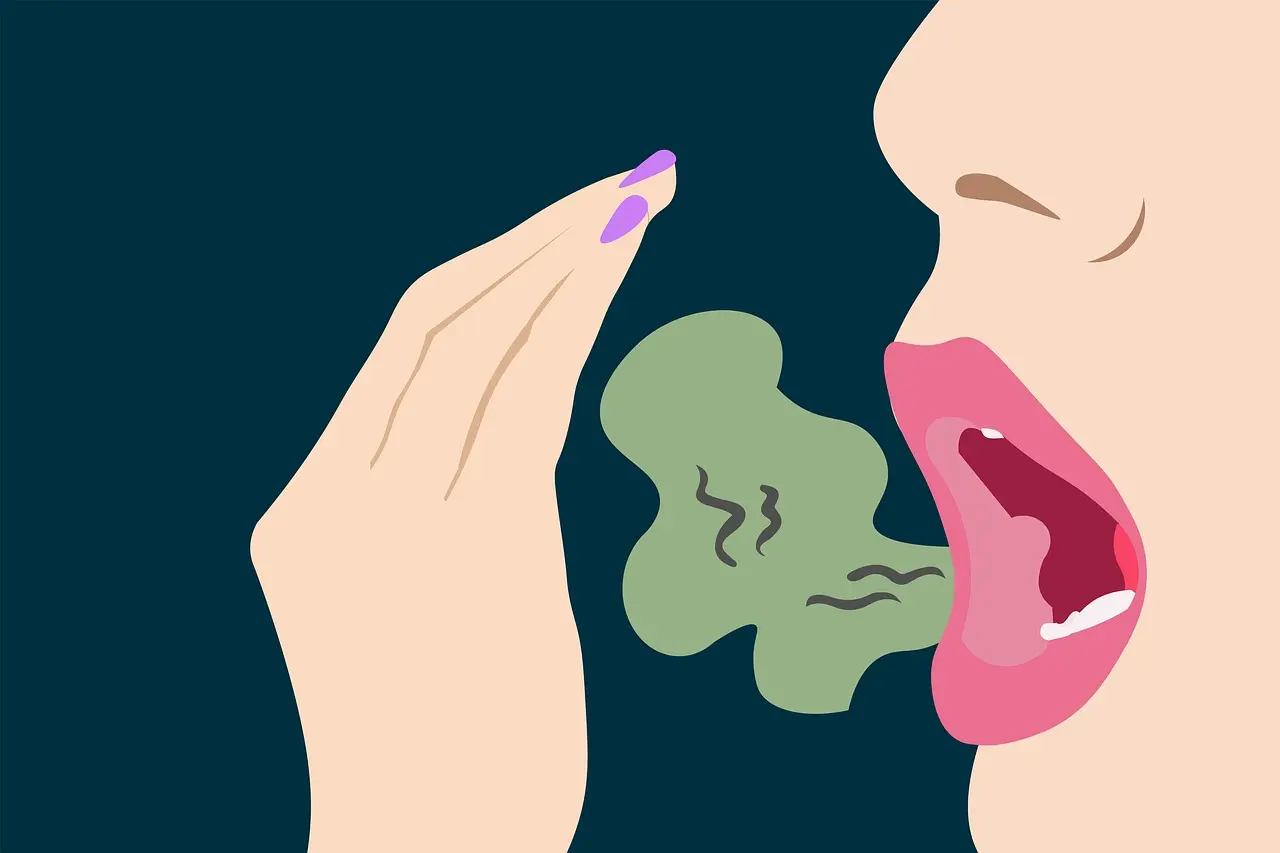
Halitosis can be caused largely by not taking care of your teeth and mouth health. Not brushing or flossing, not getting regular dental checkups, and not making sure your teeth are cleared of bacteria and food when you do brush or floss can be a major underlying issue of bad breath.
However, bad breath can also be caused by some diseases or chronic conditions such as acid reflux. In children, bad breath may be caused by a piece of food lodged somewhere that isn’t easily seen.
There are some foods that may cause bad breath as well. If you are a lover of onions or garlic, these may be contributing to your bad breath problem even after you eat them. Certain spices also may possibly enter your bloodstream after ingestion and go to your lungs, causing unpleasant odors when you breathe out.
If you are a regular coffee drinker, you already know of coffee breath and how it can get. And if you’re following that new popular diet, like Keto or low-carb, the reactions from your body may be contributing to halitosis.
So what can I do to combat bad breath?
In most cases, bad breath can be countered by good oral hygiene. If you’re struggling with bad breath, this will be the first antidote to try.
If you feel as if you have very good oral hygiene, aren’t ingesting a lot of strong smelling vegetables or spices, and are still struggling with strong halitosis that is very noticeable to you or those around you, it may be time to schedule a dentist appointment to make sure there isn’t an underlying condition that may be contributing to your bad breath.
There are a few specific things you can do to bump up your oral hygiene first:
Quit using tobacco products of any sort
Not only will this immediately help your breath issues, but quitting smoking is a huge benefit to your overall health and wellness. Even vaping can cause health problems and major issues with your mouth and oral health.
Chewing tobacco of any sort will leave stains on your teeth and have you fighting terrible odors.
Keep yourself healthy
If you’re sick, not only do you already have a buildup of something harmful in your body, but you may be more lax about taking care of yourself and doing healthy things such as brushing your teeth or keeping your mouth in good shape. This can quickly lead to a buildup of bad bacteria in your mouth and cause bad breath and plaque to form.
Switch to an electric toothbrush
If you use a standard toothbrush, switching to an electric toothbrush has the potential of keeping your mouth more clean. Electric toothbrushes may provide more thorough and deeper cleaning of teeth than standard toothbrushes.
Some electric toothbrushes can also be set to focus on stain removal or gum health, which may be an underlying cause of bad breath. Check out our full guide on how to find the best toothbrush here.
Pick the right toothpaste
Certain ingredients and types of toothpaste have the potential to help eliminate your bad breath. We’ll help you examine which of these ingredients and types may be better for you.
Floss regularly
Your dentist doesn’t tell you this every time you go in for cleaning because they hate you, and if the dentist was just trying to make money off of you they’d tell you the opposite, so there must be a reason behind it, right?
Flossing helps remove particles of food between the teeth that brushing can’t reach. If food is left stuck between teeth, this leads to a buildup of bacteria that turns into plaque and can cause cavities.
Try mouthwash
Mouthwash is like the finishing rinse on a car when you’ve gone through a car wash. Swishing mouthwash can kill bacteria that are left in your mouth even after brushing and flossing, acting as a liquid rinse to leave your mouth shiny and squeaky clean in between eating.
Stay hydrated by drinking more water
Drinking lots of water is super good for your body in general, but it can help your oral hygiene by more regularly flushing your mouth of harmful bacteria and stuck food particles.
It may also help aid your digestion, preventing acid reflux that can cause bad breath. Drinking tons of water can also help eliminate dry mouth, which is a significant cause of bad breath.
Introduce yourself to a tongue scraper
Your tongue isn’t as smooth as it may feel but is instead covered in tiny bumps and crevices that can hide and harbor bacteria and tiny food particles. A tongue scraper is better at clearing these tiny bits than a regular toothbrush and may help your overall oral hygiene.
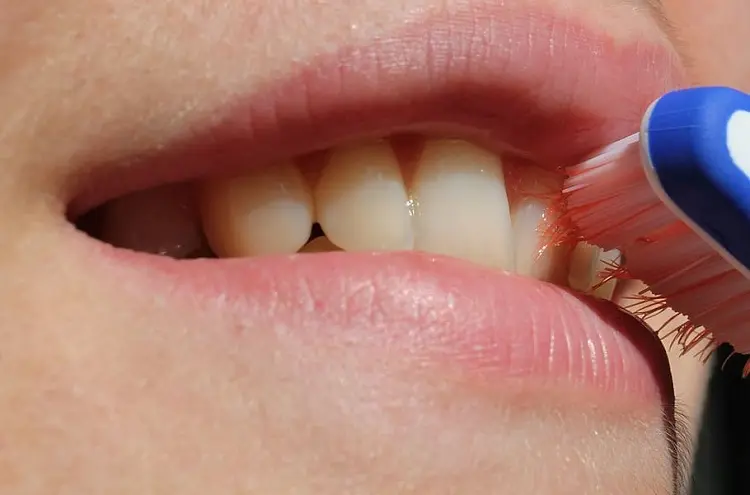
Get regular dental cleanings
Of course, this one is very important for your overall dental health and well being anyway, but regular dental cleanings will help combat bad breath.
Any tartar buildup that has occurred can’t be removed with regular brushing. Every little bit that your dentist scrapes off of your teeth may contribute to helping your mouth be more clean and fresh.
Check your diet
If you’re following a keto or low-carb diet, the ketosis occurring in your body may be contributing to your bad breath, and aside from keeping your mouth fresh there’s not much you can do about it.
The same goes if you consume a large quantity of garlic, onions, or certain spices like turmeric on a regular basis. Cutting these foods out of your diet may help combat your bad breath, but these foods are also generally healthy for you.
Explore more ingredients
There are also a few ingredients you can look for in your toothpaste that may help combat bad breath. If you’re looking to fight that particular battle, look for these ingredients in any toothpaste you buy:
- Sodium fluoride – Sodium fluoride can fight bacteria growing in your mouth in a big way. This ingredient has the potential to completely destroy all of the bacteria in your mouth that cause bad breath before it latches on to your teeth and starts to become plaque.
- Sodium bicarbonate – Yes, the ingredient commonly known as baking soda is great for your teeth and for bad breath. You may have heard of using baking soda to brush your teeth in a pinch, although the taste leaves much to be desired. This is because baking soda is great at eliminating bacteria and freshening your mouth, just like it does for your refrigerator.
- Calcium bicarbonate – This ingredient has all of the properties of sodium bicarbonate for your mouth.
- Xylitol – This naturally occurring alcohol ingredient can act a bit like a mouthwash for your breath while preventing the growth of bacteria.
- Hydrogen peroxide – Another household item that can be used in a pinch as a toothpaste by itself, hydrogen peroxide works by removing stains and freshening your breath at the same time. Although we don’t recommend brushing with it by itself – the taste, like baking soda, is pretty atrocious.
- Glycerin – Another naturally occurring compound, glycerin can help keep moisture in dry mouths, which is a leading cause of bad breath not associated with gingivitis.
- Zinc gluconate – This can help prevent and reduce tartar buildup in the mouth and along the gum line.
- Potassium nitrate – This ingredient is a powerhouse that can help prevent plaque buildup, provide protection against cavities, and treat tooth sensitivity while helping your bad breath issues at the same time.
A big advantage of the above ingredients is that they are all-natural and can be found in many natural things. Some toothpastes incorporate things such as zinc, Dead Sea salt, and essential oils that can also help freshen your breath and eliminate bacteria.
Other, man-made ingredients that may help your teeth and mouth feel fresher are:
- Pentasodium triphosphate – This ingredient can actively remove stains and break down the bacteria that cause plaque.
- Cetylpyridinium chloride – This is an antiseptic used in some alcohol-free mouthwashes to break down and destroy bacteria that can lead to plaque on your teeth.
- Nano-hydroxyapatite – This is a synthetic version of a mineral that naturally occurs in our teeth and bones and makes up more than 90% of our enamel. It has been shown to help repair decayed tooth enamel.
- Triclosan – This is an antibacterial agent found in very many household products and has been proven to slow or even stop the growth of harmful bacteria.
The Best Toothpaste for Bad Breath
Now that you know what to do to help your oral hygiene and some of the ingredients to look for, let’s talk about our favorite toothpastes for bad breath.
As seen above, picking the right toothpaste is a big part of oral health and if you’re trying to have more fresh breath it’s an even more important part. Here are our top picks for the best toothpastes to try for fresher breath.
Best for: The brusher who wants long-lasting power – Colgate Total Whitening Toothpaste
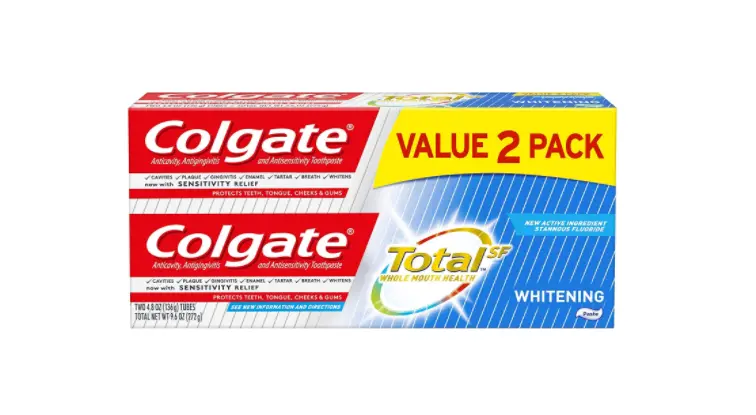
This powerful toothpaste packs a double whammy of ingredients – sodium fluoride and triclosan. Colgate is a well-known brand that has the American Dental Association Seal of Approval.
The reviews about this product say it all, with some users claiming that they feel it gives them up to twelve hours of fresh breath. The downside of this particular toothpaste is that it may be rough on people with sensitive teeth.
Best for: The brusher who wants to repair tooth enamel – Boka Ela Mint Toothpaste
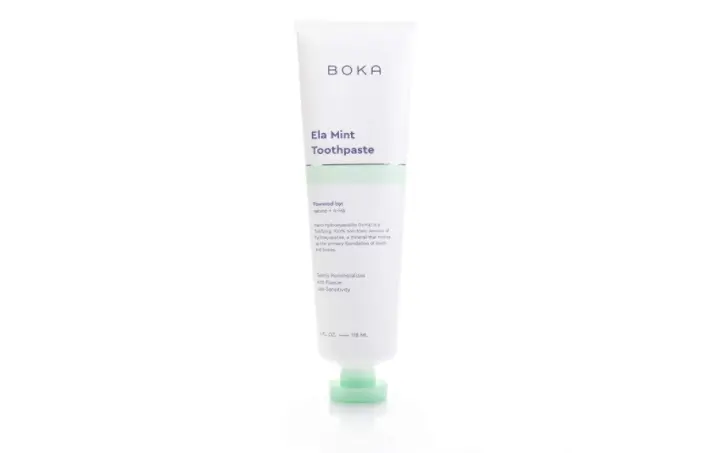
If you are looking for a fluoride-free toothpaste that is natural and may help repair tooth enamel, Boka Ela is for you. This toothpaste contains the nano-hydroxyapatite that we described above.
The rest of the ingredients are all-natural and may also help desensitize sensitive teeth. And for neutralizing bad breath while tasting fresh and clean, this toothpaste also contains peppermint and spearmint oil.
Best for: The environmentally conscious brusher – Hello Antiplaque & Whitening toothpaste tablets
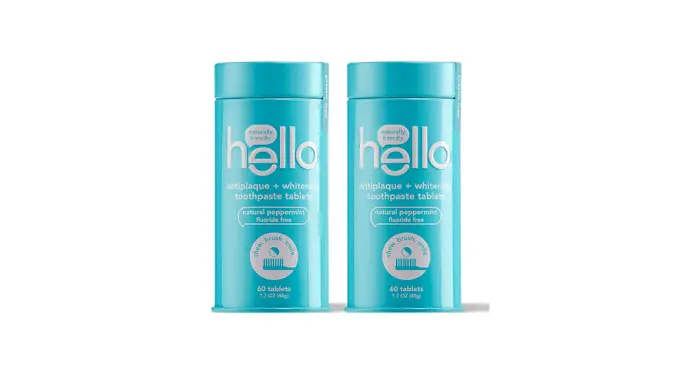
These little tablets contain xylitol, tea tree oil, and coconut oils to help prevent and kill bacteria, help dry mouth, and fresh your breath all at once.
Not your traditional toothpaste, the tablets chew into a foamy paste that you use to brush with. Individual tablets make it easy to keep things sanitary if there is more than one person in your household using the same toothpaste. And to top it all off, the metal container that they come in is easily recyclable, unlike the normal plastic toothpaste tubes.
Best for: The brusher who has sensitive teeth – Sensodyne Extra Whitening toothpaste
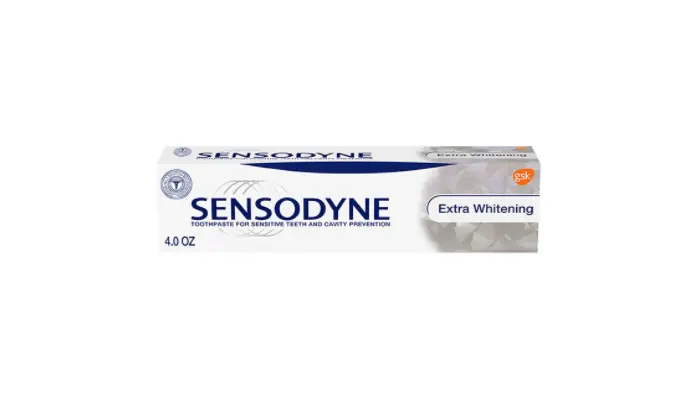
This toothpaste has the best track record for soothing sensitivity to cold or heat. The heavy hitters in this toothpaste are potassium nitrate and sodium fluoride, so you get the one-two-three punch of protecting against cavities, preventing plaque buildup, and treating tooth sensitivity while also freshening your breath. Plus, Sensodyne is a well-known brand that’s been around for ages, so you know it works.
Best for: The brusher who wants that extra kick – Colgate Max Fresh toothpaste with mini breath strips
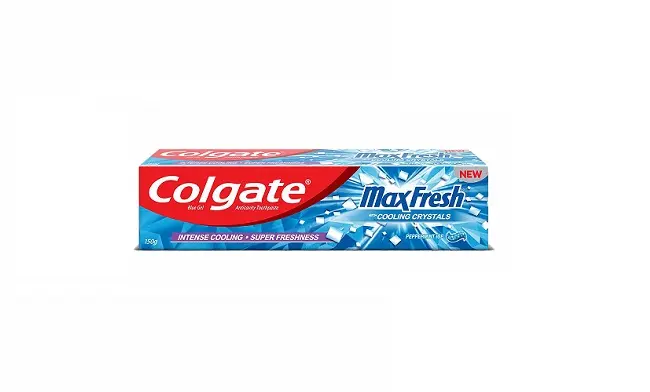
We have to admit that we love the idea of including miniature strips of breath-freshening goodness in with every dab of toothpaste.
In addition to the killer mint taste and cleaning power of sodium fluoride, this toothpaste incorporates strips of dissolvable fresh breath power that can help your breath stay fresher longer. Despite the great taste, it’s sugar-free and gluten-free as well, so no worries there.
Best for: The brusher who wants to stay all-natural – CloSYS Flouride toothpaste
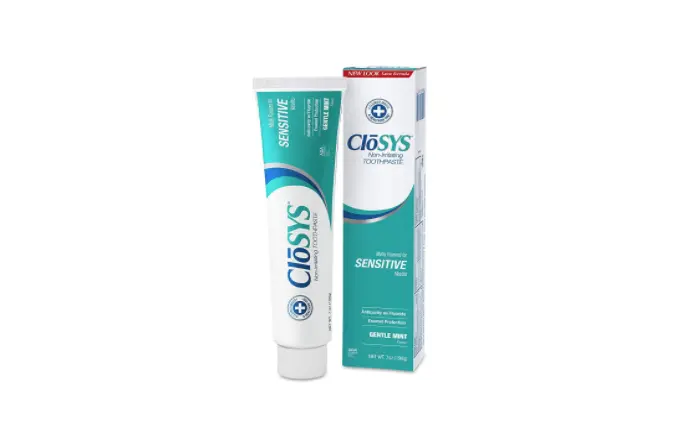
This toothpaste has all-natural ingredients with fluoride as the main ingredient behind its cleaning power. This is a simple, no-frills toothpaste that will get your mouth simply clean and fresh without all the bells and whistles.
Fluoride is well known to fight cavities and protect enamel better than many other ingredients, though fluoride also has the potential of being painful if you have sensitive teeth.
However, reviewers of CloSYS say that this particular kind does not affect their sensitive teeth. This toothpaste may also further help your oral health by balancing the pH of your mouth, reducing acidity.
Best for: The brusher who loves aromatherapy – Twice Early Bird & Twilight toothpaste
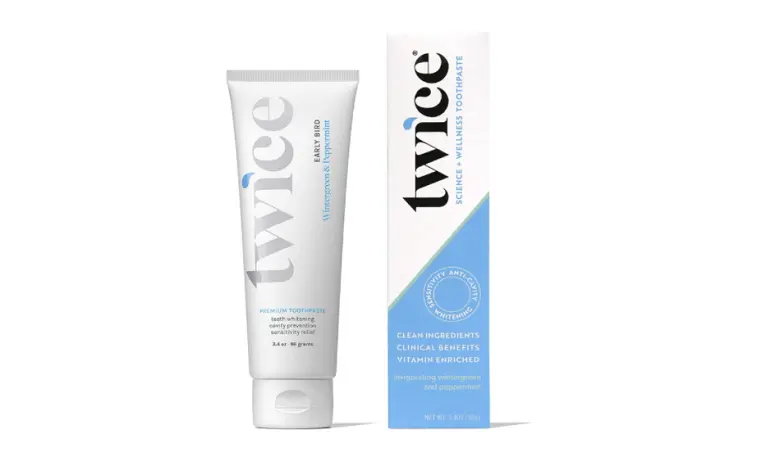
This awesome toothpaste set is one we’re going to try for sure. The Early Bird version has peppermint and wintergreen to energize your morning while refreshing your breath at the same time.
The Twilight version has notes of vanilla and lavender to help you relax before bed. And both toothpastes contain pentasodium triphosphate to help break down stains on teeth and remove the bacteria that causes plaque and bad breath.
Best for: The brusher who wants super strong minty refreshment – Listerine Essential Care toothpaste
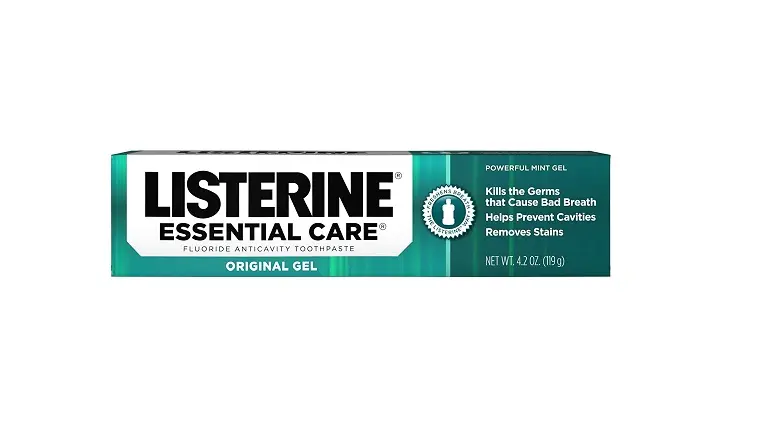
If you’ve used Listerine, you know the blast of clean it can give to your breath and how long it can last. Here, Listerine has turned that freshness into a toothpaste. The strong mint smell can cover up even the worst cases of halitosis and keep it covered for longer than most other toothpastes on the market.
Reviewers particularly say it is great to use if you use a mouthguard which has the potential to trap bacteria and make bad breath worse. However, be prepared to be knocked out of your socks with the overpowering mint freshness.
Best for: The brusher who is tired of the same old flavor – Oxyfresh Maximum Fresh Breath Lemon Mint toothpaste
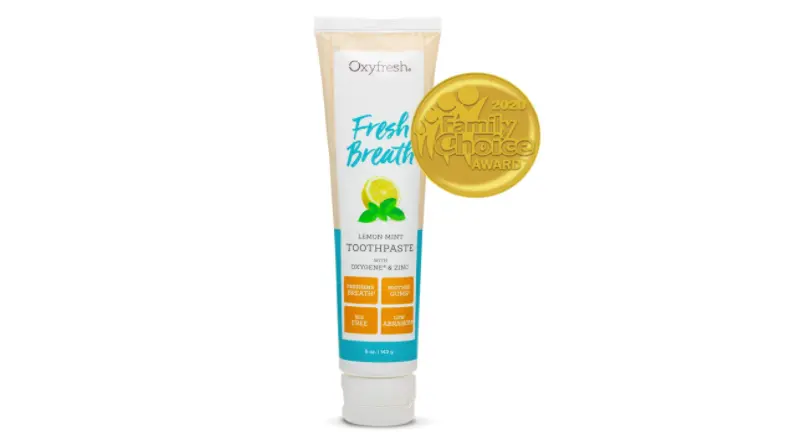
While this does still have a minty flavor, the citrus oils in the mix add a delicate lemony flavor that pairs great and gives an extra boost of freshness to your breath.
Glycerin, sorbitol, and zinc make an all-natural combination that will clean your teeth and sweeten your breath while being kind to your sensitive teeth. This toothpaste is one of the more pricey toothpaste in our list, but we think it’s worth it for the benefits and fresh taste.
Best for: The brusher who loves their coffee (or wine!) – Philips Sonicare BreathRx Whitening toothpaste
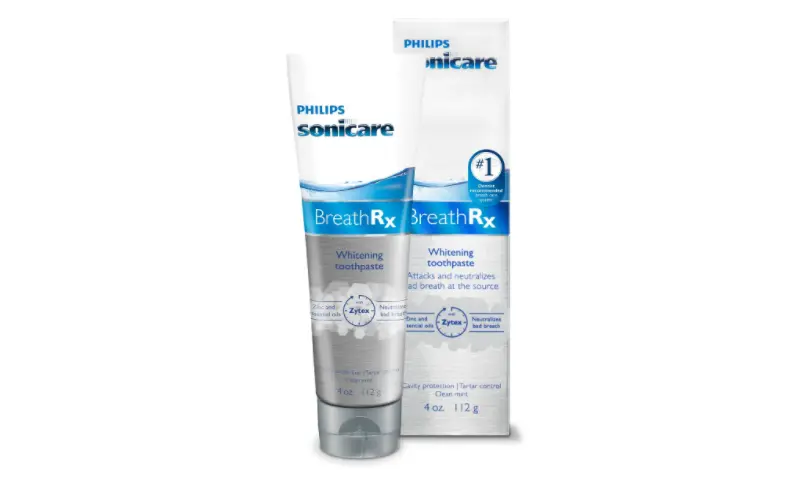
Right on the front this toothpaste tells you it has zinc and essential oils that help neutralize bad breath, and it’s not kidding. What we also love about this toothpaste is its whitening power.
This is one of the best-reviewed toothpastes when it comes to removing those stubborn stains that cling to your teeth from things like coffee and wine.
This toothpaste also has fluoride for the best cavity protection, so you can keep your teeth clean, remove stains, and knock out that bad breath in one convenient package.
Best for: The brusher who wants tried and true – TheraBreath Fresh Breath toothpaste
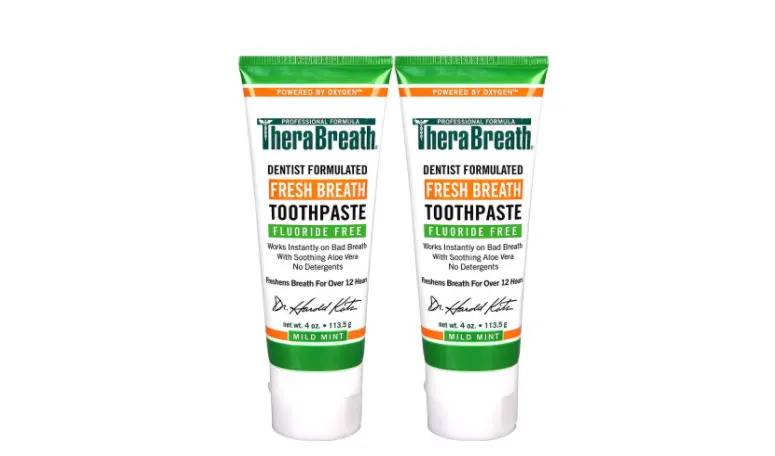
TheraBreath toothpaste has been around and getting rave reviews since 1994. This fluoride-free formula is great on sensitive teeth but still provides a great punch against bad breath.
Made by dentists for their own families, this toothpaste doesn’t act like many other common toothpastes in that it won’t foam in your mouth, but reviewers say that despite this fact the truth comes in how much better they notice their breath smelling.
Many reviewers have said it is also a very noticeable difference for those around them. Plus it’s an all-natural formula, vegan, kosher, and made in the USA.
Final Rcommendation
Of all the toothpastes we looked at here today, our final recommendation would have to be the Colgate Max Fresh toothpaste. When we’re going for fresh breath we want to keep it as long as possible into our day, and we love the idea of including tiny strips of breath freshener in the toothpaste for that extra kick of mouthwash clean.
The value for your money is great, and the reviews across multiple places speak for themselves. People consistently talk about how fresh and clean their mouth feels and how long their fresh breath lasts after using this toothpaste, many users even call it their favorite, or the best toothpaste out there.
Try it yourself and see what you think!
We hope this list of toothpastes will help you find a brand and style that works great for you. Not only are all of these toothpastes well-reviewed, but most of them are also very affordable and come in multi-packs that lower the price even more.
Trying to take good care of your oral health shouldn’t mean having to break the bank! Following the tips above and picking one of these great toothpastes should have you well on your way to the freshest breath around.
FAQs about bad breath
Yes! You don’t notice it that often because those people are practicing great oral hygiene and using many of the habits listed above. It’s estimated that 25 to 50 percent of adults suffer from bad breath and regularly fight against it. So you definitely aren’t alone.
No. Morning breath is still halitosis, it’s just usually caused by the dry mouth that can occur when you sleep at night.
No. Everyone has the potential to suffer from halitosis, though some are more prone to it, and the tips listed above can help anyone help prevent it, along with regular trips to your dentist.
This is a tricky one. If your bad breath is mainly caused by dry-mouth, chewing sugar-free gum may help lessen or eliminate the bad breath you are having. However, there are many causes of bad breath besides dry mouth, and chewing anything but sugar-free gum can add to the bacteria in your mouth that are the main underlying cause.
No. In rare occasions, bad breath can originate from your sinuses, tonsils, or even your bloodstream. If you are doing everything to fight bad breath and it’s still a problem, this is when it would be the time to have a specific dentist visit to talk to them about your halitosis issues.
Conclusion: Which is the Best Toothpaste for Bad Breath?
We hope this list of toothpastes will help you find a brand and style that works great for you. Not only are all of these toothpastes well reviewed, but most of them also are very affordable and come in multi-packs that lower the price even more.
Trying to take good care of your oral health shouldn’t mean having to break the bank! Following the tips above and picking one of these great toothpastes should have you well on your way to the freshest breath around.

